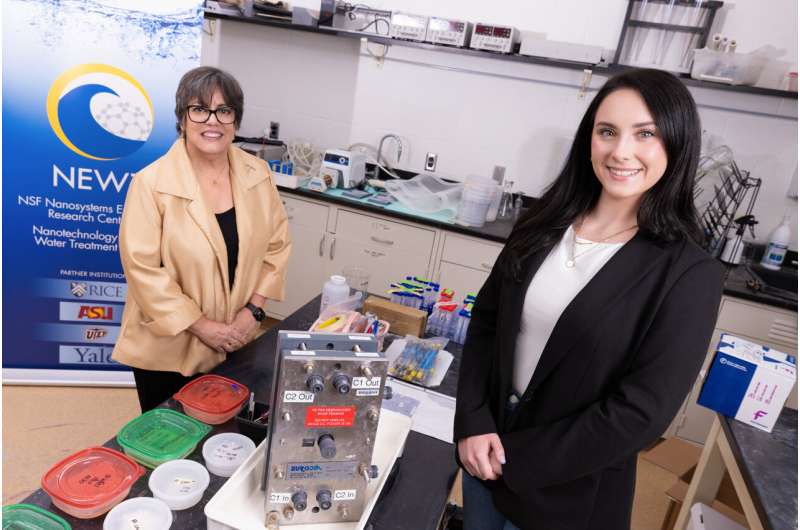
October 29, 2024 by University of Texas at El Paso
Collected at: https://techxplore.com/news/2024-10-student-award-method-desalinate.html
Tayia Oddonetto was an undergraduate student when her professor inspired her to solve water scarcity. “During class, the professor said that if someone discovered how to turn brine, water with a high salt concentration, into something of value, it’d be revolutionary for the planet,” said Oddonetto. “At that moment, I told myself I was going to be the one who found the solution for brine, and that thought has never left me.”
Oddonetto’s perseverance paid off. Her UTEP research on brine desalination—a novel method that can convert over 90% of salt water to fresh water—recently earned her first place in the National Science Foundation Engineering Research Centers Perfect Pitch Competition.
Oddonetto, now a doctoral student in environmental science and engineering, specifically developed and pitched salt-free, electrodialysis metathesis, a novel approach to the desalination of brine (salt) water. The technique is described in the journal Desalination, and differs from reverse osmosis (RO), a process by which salt in water is removed.
Although RO is the standard in desalination, Oddonetto said, one drawback is that it has a limited water recovery and only converts up to 85% of salt water into fresh water, leaving the remaining 15% of water as concentrated brine. This leftover brine is typically injected underground via a process called deep-well injection. But deep-well injection has consequences, such as environmental risks and the waste of valuable metals and minerals, Oddonetto explained, including lithium, which is used in the development of phones, laptops and electric vehicles.
Salt-free electrodialysis metathesis treats brine by passing it through ion exchange membranes, thin sheets or films, and electrical currents that work to separate salt from water at the molecular level. Results have been promising, with over 90% of salt water being converted to fresh water after going through reverse osmosis and salt-free electrodialysis metathesis in succession. In addition, Oddonetto said the technique generated higher levels of valuable metals and minerals that can be repurposed across several industries including technology, health and food.
“Tayia’s research will help public utilities save money while enabling people nationwide to reduce their utility bills in a meaningful way, advancing society’s aim of water conservation,” said Ivonne Santiago, Ph.D., an associate professor in the Department of Civil Engineering at UTEP and Oddonetto’s doctoral advisor.
“In the next few years, I anticipate that we will see Tayia’s research applied on a large scale and fully see the tremendous benefit her work can have on humankind. Her journey is a testament to her perseverance, the importance of working on challenging problems and the value of a strong work ethic and positive attitude.”
The next step in Oddonetto’s research is to advance her work with multiple live experiments run in collaboration with the National Alliance for Water Innovation (NAWI), El Paso Water, the Kay Bailey Hutchison Desalination plant, New Mexico State University and the U.S. Bureau of Reclamation. The experiments will serve to refine the salt-free electrodialysis metathesis process further and provide more insight as to the mechanisms that can be used to make the approach more cost-efficient and easily applicable on a large scale.
“This is a complex and difficult challenge to tackle and the journey has been full of roadblocks and setbacks,” said Oddonetto. “But I kept at it, and to be recognized for the value of my work is proof that all my effort and belief in this project was worthwhile.”
More information: Tayia L. Oddonetto et al, Assessment of salt-free electrodialysis metathesis: A novel process for brine management in brackish water desalination using monovalent selective ion exchange membranes, Desalination (2024). DOI: 10.1016/j.desal.2024.118160

Leave a Reply